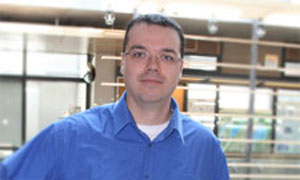UOIT researcher awarded funding to develop fuel cell-based ethanol sensors
May lead to breath alcohol testing devices that are more sensitive and cost-effective
May 19, 2011

OSHAWA, ON - Dr. Brad Easton, assistant professor, Chemistry in the University of Ontario Institute of Technology's (UOIT) Faculty of Science has received $905,600 in funding for his ongoing research to develop next-generation materials for fuel-based ethanol sensors. Dr. Easton's ultimate findings are expected to have important economic and industrial consequences in the area of road safety.
Dr. Easton's research award comes from two sources. The Natural Sciences and Engineering Research Council of Canada (NSERC) is providing $393,000 through its Collaborative Research and Development grant program, with the remaining $512,600 provided by Toronto, Ontario-based Alcohol Countermeasures Systems (ACS) in cash and in-kind support.
"Fast, reliable and cost-effective fuel cell-based sensors for ethanol detection are critical when it comes to increasing road safety in Canada, but current systems employ technology that dates back to the 1970s," said Dr. Easton. "While significant enhancements have been made since then in fuel cell technology for power generating devices, they have not been investigated and validated in breath alcohol sensors. One of our major goals is to reduce cost with new sensors that employ lower loadings of platinum alloys."
More durable membrane materials, such as those targeted for high-temperature fuel cell applications developed in Dr. Easton's lab will also be investigated.
"In addition to enhancing the fundamental understanding of this sensory system, Dr. Easton's findings may yield sensory devices that are more sensitive and more cost-effective than breath alcohol devices currently in use," said Felix Comeau, Chairman and CEO, ACS. "For nearly 40 years, Alcohol Countermeasure Systems has been a leading producer of accurate and reliable breath alcohol testers and we anticipate this research will ensure we remain an industry pioneer."
"Partnerships supported through NSERC's Collaborative Research and Development Grants help to push crucial R&D projects to the next level," said Suzanne Fortier, President of NSERC. "The work being done by Dr. Easton and Alcohol Countermeasures Systems will contribute to cost savings and innovation, leading to business growth and job creation."
"We're very pleased to be partnering with ACS on this project," added Dr. William Smith, dean, Faculty of Science, UOIT. "It's an excellent example of how basic scientific research can contribute to the success of a Canadian business enterprise."
-30-
About NSERC
The Natural Sciences and Engineering Research Council (NSERC) aims to make Canada a country of discoverers and innovators for the benefit of all Canadians. The agency supports university students in their advanced studies, promotes and supports discovery research, and fosters innovation by encouraging Canadian companies to participate and invest in postsecondary research projects. NSERC researchers are on the vanguard of science, building on Canada's long tradition of scientific excellence.
About ACS
Alcohol Countermeasure Systems (ACS) is a leading producer of alcohol interlocks and breath alcohol testers. Originally designed for law enforcement in 1976, the ACS product line has expanded to serve the automotive, industrial, law enforcement, public and personal safety markets. With numerous patents worldwide, ACS remains a pioneer by employing over 270 industry experts to produce some of the most accurate and reliable alcohol sensing equipment available in the industry.
Corporate headquarters are located in Toronto, Canada. Customer service is supported globally through our satellite offices in Australia, Europe, Asia and the United States of America.
About Ontario Tech University
A modern, forward-thinking university, Ontario Tech advances the discovery and application of knowledge to accelerate economic growth, regional development and social innovation. We inspire and equip our students and our graduates to make a positive impact in a tech-focused world. For us, it’s not only about developing the next tech breakthrough. Understanding and integrating the social and ethical implications of technology differentiates us as university. Learn more at ontariotechu.ca.
Media contact
Bryan Oliver
Communications and Marketing
Ontario Tech University
905.721.8668 ext. 2209
bryan.oliver@uoit.ca



